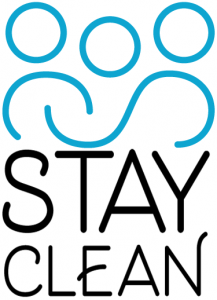Advice For The First Day Of Kindergarten
April 30, 2021 By Gene Gilchrist, Ph.D., Chief Executive Officer
By Gene Gilchrist, Ph.D., Chief Executive Officer
Stay Clean
gene.gilchrist@stayclean.com
As schools reopen across the country thousands of first-time students face the prospect of something very new in their lives. Unlike their predecessors they also feel the anxiety reflected from adults after a long and trying year of Covid pressures. A frightening time in life during a frightening time in the world.
The Courier Journal of Louisville recently printed an article by Olivia Krauth titled “Kindergartners are going to school for the first time. We asked kids for words of wisdom”. We suspect that this was targeted to the lighter side of the news, but could not help but note the unguarded wisdom from young people ages 8-10. We suspect that the advice is applicable across so many parts of life.
At Stay Clean, a cloud-based addiction treatment platform, we are concerned with creating access to treatment for substance abuse disorder (addiction to the lay person). In a nation where only 12% of all the addicts and alcoholics ever encounter treatment our effort is sorely needed. Our clinicians are extraordinarily qualified by dint of education, training and experience to help in a frightening time in the life of the addict. Nevertheless, and not unlike the younger people just starting school, the addict new to recovery is in some respects finding their way alone. In the case of the newly recovering addict and/or alcoholic this transition could mark the difference, literally, between life and death.
As detailed by the American Addiction Centers, early recovery is a stage when people are most likely to relapse back to their addiction. The individual must deal
with extreme emotions that appear to be beyond their capacity. Of course, during their active time with alcohol and drugs they were out of practice with problem solving. Now, suddenly, they experience a variety of issue often including:
-
• Withdrawal symptoms that interfere with physical health and mood
• Insomnia
• Nutritional deficiencies
• The wreckage of their past actions
• Legal, financial, marital, and employment troubles
• Raw emotions without chemical and alcohol salve
• Major changes in life circumstance
Appropriately, then, twelve step programs have advice for the newcomer. This list from Alcoholics Anonymous for example:
-
• Create and maintain a daily schedule
• Make meetings a priority
• Find a sponsor, mentor, therapist, clergy
• Create a safe living and working environment
• Ask for help from loved ones
• Make a list of goals
• Attend to diet, sleep, exercise
• Practice coping skills
• Don’t rush back to work
• Limit social engagements
• Avoid major life changes
• Celebrate milestones
• Give thanks every day
Serious advice and since it is from AA we know that it is based on 85 years of experience from people successful in recovery. Yet, reading the advice from those young people, one cannot help but appreciate that they are unburdened by the seriousness of life and that their fresh perspective may have insights that those of us older than 10 may not see through the fog of life experience.
For instance, regarding transition to the new environment:
- “My advice to kindergarteners or any new students is that you will make friends, you just have to be yourself.” • “I feel like the other kids should support them and tell them the rule around there so they can fit in and understand what to do so it’s like they have been to school before.”
- “You shouldn’t be scared on the first day. You’ll have a new teacher, you’ll make lots and lots of new friends and just stay confident, be you, don’t let anybody change you.
- “Don’t be afraid. You’re going to have a great day. You’re going to have new people — nice people. And you always have someone to talk to when you need help. So, don’t be afraid, be confident and be awesome.”
- “You’ll make friends. And if you make friends, you’ll be happy. And on break, you can play with your friends and you’ll have a really fun time. And when you’ve been in school for a short time, you’ll start to like it.”
Sadly, the fear of this transition to a life in recovery is marked not only by a sense of externally imposed requirement but the shame associated with the stigma surrounding addictions. The advice to “be yourself” and that “you will make new friends”, is refreshing and important. The newly recovered do not yet understand that their new environment is populated by people who share their exact disease state and many of the same experiences.
In twelve step circles there is a phrase, “grateful addict”, that might strike some as an oxymoron. What that means is that rediscovering oneself and one’s value will happen and with it comes a new self-awareness, a new appreciation that might not have happened if not for recovery and the addiction that preceded recovery. The advice that one should “don’t be afraid. You’re going to have a great day” is very reinforcing.
Sponsorship is a key element in recovery stressed from day one in treatment and in twelve step programs of all sorts. Yet too often newcomers are not greeted with a welcome hand and warm smile. The admonition to people in recovery vis-a-vis the newcomer, “I feel like the other kids should support them and tell them the rule around there…” cannot be stressed too often.
The advice offered about how to be a part of the new environment was also delightfully on target:
- “Make sure that you respect your teacher. Don’t run in the halls. Respect the rules …
- “Be kind to your classmates and try to make them want to be there. Try to be really nice to your teacher; you respect your teacher, and just be really nice to other people and smile and just be kind.”
- “Get to know the person in the office who has the Band-Aids. You will need them.”
- “One thing you should always try doing is really trying to pay attention to the teacher to get good grades.
- “If you miss something, it’s OK, just keep trying. Which means, if you get a bad grade, then it’s not the end of the world. That doesn’t mean anything. It just means you probably need to start studying a little more or learning or paying attention more.”
- “Be in the moment. Play with your friends but be nice. Don’t wait until the last minute to do your work.”
- “There’s always going to be a kid in the class that’s just kind of annoying and not too great, so if you’re not one of those kids, you just want to try and pretend he’s not there, she is not being distracting, or whatever they’re doing.
- “My favorite part of school is recess. There’s a basketball court, a playground and a field for fifth graders. I wonder what recess will look like. You will probably have to wear your mask and stay 6 feet apart, but you can still play with your friends”.
- “Oh, yeah, and last, make sure your handwriting on paper is neat. You want your teacher(s) to be able to read it and you don’t want to get stuck inside during recess.”
- “The best part of kindergarten to me was getting to read different books. I think the kindergarteners will still be able to do that.
Our Chief Clinical Officer at Stay Clean often notes that “relapse is common but not required”. Our young friends seem to understand that as well.
“Knowing who holds the band aids” is great advice for those difficult moments that will certainly occur. Similarly, “If you miss something is it OK”, is apt advice as well as is the suggestion that, “It just means you probably need to start studying a little more or learning or paying attention more.” Relapse is not required, but if it happens just get back up and reengaged.
Just because the setting is designed to be helpful and well-intentioned does not mean it will be free from that unpleasant individual. “There’s always going to be a kid in the class that’s just kind of annoying and not too great…” the children admonish, but that does not mean that one bad apple spoils the bushel. Above all, it is not an excuse to leave the supportive environment.
It seemed especially prescient that these young people placed such emphasis on respect – – respect for the teacher, respect for each other, respect for the process. Making a transition from a very unhealthy environment it would be very natural to lack an “other awareness” or even to hold a grudge that could be visited on anyone. Respecting the process does not mean surrendering independence or responsibility but a healthy respect for a therapeutic process that has worked for millions in the past.
Although it was probably a chuckle to most of us that “My favorite part of school is recess”, it is wonderful advice to take the time to enjoy the process, the sense of hope, the playful side of recovery. Recovery is not all a bed of roses, there will be difficult moments, there is hard work, but there is also the fun and playful side, and one should not miss those when they occur.
Finally, good advice for life in general and for recovery in particular,
- “Be brave, don’t be afraid to get up every day, find things that you can do to make you happy and excited. Make friends on your very first day and have your mom pack your favorite lunch. Every day it will get more fun.”
The Stay Clean web site has a quote from our Founder; “Taking responsibility is an expression of hope”. We believe that treatment works, recovery is possible. Personally, we know that is true. We recognize, too, that while we share our experience, strength and hope, that recovery requires courage. We celebrate that courage.
Literature is full of tales of the Journey – – “The Odyssey, “The Aeneid”, “On The Road”, “Zen and the Art of Motorcycle Maintenance” among many, many others. We encourage anyone in early recovery to enjoy the journey. Yes, remain focused on the prize, but enjoy yourself on the way.
And, of course, if possible, “have your Mom pack your favorite lunch”.
 JOIN THE DISCUSSION
JOIN THE DISCUSSION
Add your thoughts about Advice For The First Day Of Kindergarten by submitting your comments in the reply box below. All comments are moderated prior to being posted on the web site. Thank you.
Stay Clean is a groundbreaking approach to create additional opportunities for addicts, alcoholics and their loved ones to find an answer. Created by recovering addicts and alcoholics, and people with experience in codependent relationships, Stay Clean is a cloud based, easily accessible, 24 hour community of recovering people and their loved ones helping each other and offering a comprehensive array of recovery services online. Members will access online Recovery Meetings, directions to find on site 12 step meetings in their area, and interact with each other in forums to find answers to their questions. There are proprietary treatment options similar to distance education and face-to-face counseling via telehealth. Counselors and peer coaches will always be highly qualified, highly credentialed, very experienced.
Finally, and perhaps most importantly, members will find easily accessible resources to work through life skills such as relationship building, parenting, career and employment, legal issues and financial management to name a few – they will find help with those kinds of issues that suffered the most during their years of active addiction.
For more information, please visit the Stay Clean web site at https://www.stayclean.com/.
ABOUT THE AUTHOR
Gene Gilchrist, Ph.D. is the Chief Executive Officer of Stay Clean a cloud-based clinical treatment and recovery community headquartered in Louisville, Kentucky.
SUBMIT A GUEST BLOG
Are you interested in writing a guest blog for The Recovery Word? Click here for additional information.

